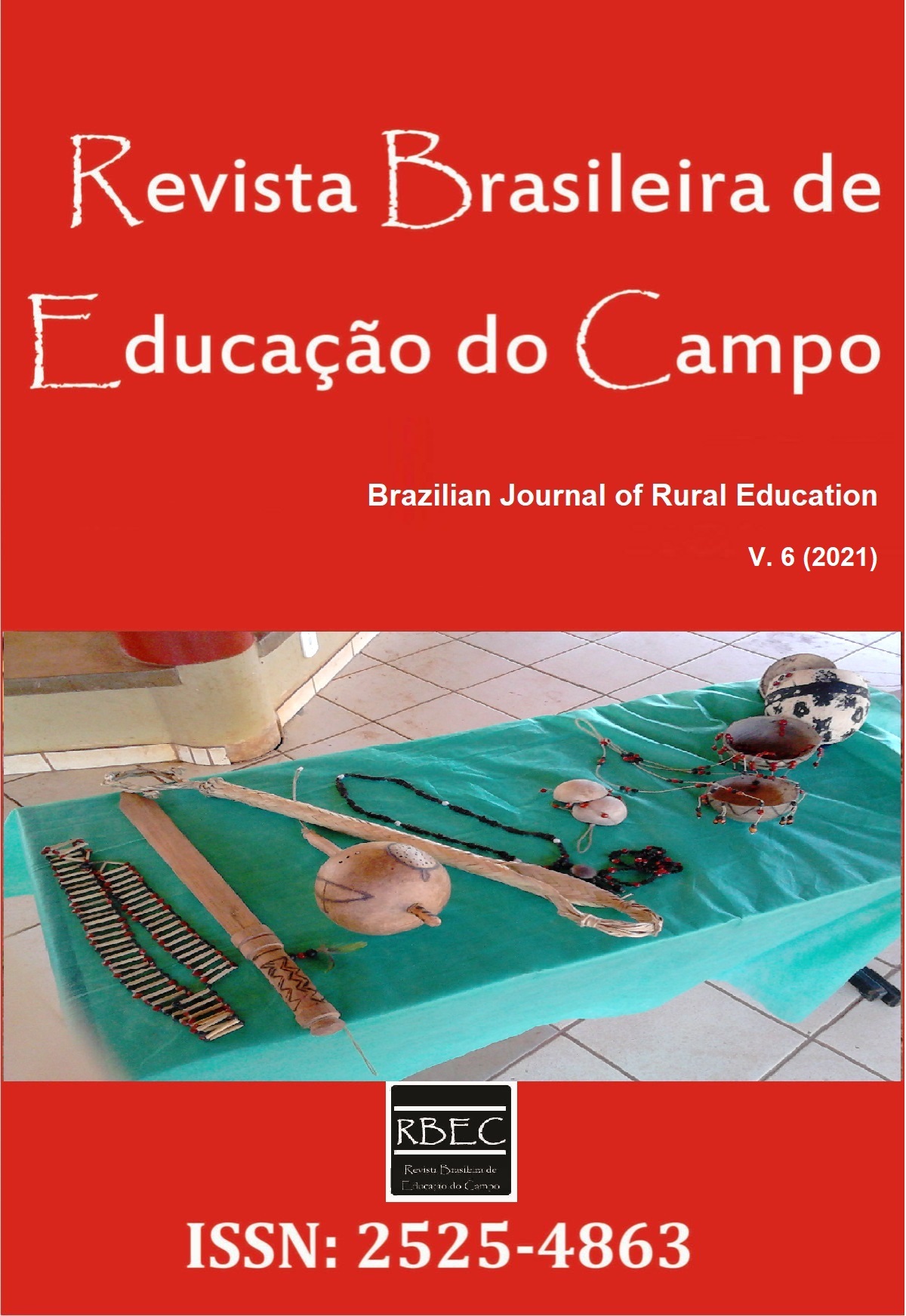Practices and knowledge in public higher education in the Bahia Recôncavo
DOI:
https://doi.org/10.20873/uft.rbec.e12486Schlagworte:
Education, Dialogy, Educational PracticesAbstract
ABSTRACT. In this article we will present three excerpts of the activities related to the Centro de Cultura, Linguagens e Tecnologias Aplicadas (CECULT/UFRB), through the performance of three professors of this Center (Francisca Helena Marques, Jorge Luiz Ribeiro de Vasconcelos and Solon de Albuquerque Mendes). All the activities have in common the concern for the process of bringing public higher education to the interior of the country and the insertion of knowledge from the rural environment, articulated through teaching, research and extension. It is noteworthy that CECULT has many students from rural communities in the municipalities of Recôncavo Baiano, and it is appropriate to deepen these practices and exchanges of knowledge that occur in the process of internalization of public higher education. We adopt a mixed methodological approach, involving aspects of experimental, bibliographical, phenomenological, qualitative, quantitative research. Regarding the results, we can observe more closely the profile of four students, and through this, build a more dialogic relationship between educators and students.
Downloads
Literaturhinweise
Abib, P. R. J. (Org). (2013). Mestres e capoeiras famosos da Bahia. Salvador: EDUFBA.
Instituto do Patrimônio Histórico e Artístico Nacional (Iphan). Bembé do Mercado. Página de site. Recuperado de: http://portal.iphan.gov.br/pagina/detalhes/1958. Acesso em 12 jun. 2021
Brasil. Ministério da Educação (2020). Universidade Federal de Minas Gerais. Resolução Complementar No 01/2020, de 28 de Maio de 2020.
UNILAB – Universidade da Integração Internacional da Lusofonia Afro-brasileira. Site institucional. Recuperado de: https://unilab.edu.br/2021/02/22/unilab-aprova-certificacao-do-notorio-saber-em-artes-oficios-e-cosmologias-tradicionais/. Acesso em 10/05/2021.
Carvalho, J. J., Cohen, L. B., Correa, A. F., & Chada, S. (2016). O Encontro de Saberes como uma contribuição à etnomusicologia e à educação musical. In Lühning, A., & Tugny, R. P. (Orgs.). Etnomusicologia no Brasil (s./p.). Salvador: EDUFBA. https://doi.org/10.7476/9788523218805.0008
Carvalho, J. J. (2020). Encontro de saberes, descolonização e transdisciplinaridade: três conferências introdutórias. In Tugny, R. P., & Gonçalves, G. (Orgs.). Universidade popular e encontro de saberes (s./p.). Salvador: EDUFBA; Brasília: Instituto de Inclusão no Ensino Superior e na Pesquisa - UNB.
Castro, M. A. M. (2019). Nossos mestres, nossa cultura (capoeira de Santo Amaro – BA). Santo Amaro: Edição do autor.
Costa, M. L., & Cabral, C. L. O. (2016). Da Educação Rural à Educação do Campo: uma luta de superação epistemológica/paradigmática. Revista Brasileira de Educação do Campo, 1(2), 177-203. https://doi.org/10.20873/uft.2525-4863.2016v1n2p177.
Freire, P. (1987). Pedagogia do Oprimido. 17a edição, Rio de Janeiro, Paz e Terra.
Freire, P. (1997). Pedagogia da Autonomia: saberes necessários à prática educativa. Rio de Janeiro: Paz e Terra.
Freire, P. (2007). Ação cultural para a liberdade e outros escritos. Paz e Terra.
Giumbelli, E. (2003). Para além do "trabalho de campo": reflexões supostamente malinowskianas. Revista Brasileira de Ciências Sociais, 17(48) 91-107. https://doi.org/10.1590/S0102-69092002000100007
Lima, P. C. (2014). Teoria e Prática do Compor II: Diálogos de invenção e ensino.
Edufba, Salvador, 2014.
Magalhães Filho, P. A. (2012). Jogo de discursos: a disputa por hegemonia na tradição da capoeira angola. Salvador: EDUFBA.
Maia, M. (2018). Museus brasileiros e a hiperconectividade: a experiência com a plataforma Tainacan no acesso ao patrimônio Afro-digital. Revista Museu. Recuperado de: https://www.revistamuseu.com.br/site/br/artigos/18-de-maio/18-maio-2018/4751-museus-brasileiros-e-a-hiperconectividade-a-experiencia-com-a-plataforma-tainacan-no-acesso-ao-patrimonio-afro-digital.html
Marques, F., & Veiga, M. (2007). Being Young Digital Creators: a practical booklet for educators. UNESCO.
Motte, D. (1991). Contrapunto. Milano: Ricordi.
Ramos, J. (2011). O semeador de orquestras – História de um maestro abolicionista. Salvador: Solisluna Editora.
Seeger, A. (2004). Etnografia da música. Trad. Giovanni Cirino. Revista do Núcleo de Estudos de Som e Música em Antropologia da FFLCH/USP, n. 1.
Silva, V. G. (2000). O antropólogo e sua magia: Trabalho de Campo e Texto Etnográfico nas pesquisas antropológicas sobre religiões afro-brasileiras. São Paulo: Edusp.
Zonzon, C. N. (2017). Nas rodas da capoeira e da vida: corpo, experiência e tradição. Salvador: EDUFBA. https://doi.org/10.7476/9788523220334
Veröffentlicht
Zitationsvorschlag
Ausgabe
Rubrik
Lizenz
Creative Commons Attribution License
Creative Commons Attribution License
Proposal for Copyright Notice Creative Commons
1. Policy Proposal to Open Access Journals
Authors who publish with this journal agree to the following terms:
A. Authors retain copyright and grant the journal right of first publication with the work simultaneously licensed under the Creative Commons Attribution License that allows sharing the work with recognition of its initial publication in this journal.
B. Authors are able to take on additional contracts separately, non-exclusive distribution of the version of the paper published in this journal (ex .: publish in institutional repository or as a book), with an acknowledgment of its initial publication in this journal.
C. Authors are permitted and encouraged to post their work online (eg .: in institutional repositories or on their website) at any point before or during the editorial process, as it can lead to productive exchanges, as well as increase the impact and the citation of published work (See the Effect of Open Access).














